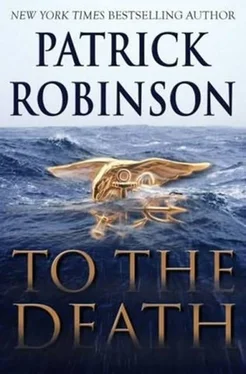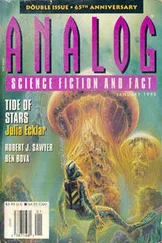A detective superintendent was already on the scene, talking to the admiral’s bodyguards, trying to get an idea of the direction from which the bullet had been fired. All three of the Americans had seen Big George go down, and all three confirmed that the shot he took to the left temple must have been fired from a building across the street.
Arlington Street itself was under strict scrutiny by the security forces and the police. No one had fired from ground level, or someone would have seen them. The shot most definitely had come from one of the two buildings on the south corners of Dover Street, most probably the one on the southeast.
The superintendent looked up and could see the police marksmen on top of the building. He turned to the sergeant who was supervising the deployment of his men as they arrived, and asked, “Did we search that building this morning?”
“Certainly did, sir. Just before 0500 this morning. I was in there myself. We checked every office, top to bottom. The place was deserted. It never opens ’til 7 A.M.”
“Did you go inside the offices?”
“No, sir. They were all locked up for the night. But we tried every door, checked there were no lights on.”
“Who’s the doorman?”
“Reggie Milton, sir. We picked him up at home in Putney just after four this morning, sir. He took us through, swore to God no one was left in the building last night, swore to God no one was there when we entered this morning.”
By this time, the car bearing Arnold and Kathy had swooped through the Hyde Park underpass and then swung into Belgravia. Two police outriders led the way and came to a stop in Lowndes Square. One of them dismounted and walked back to talk to the chauffeur from the U.S. embassy.
“We’re evacuating Admiral and Mrs. Morgan,” he said. “Out of London immediately. By helicopter. Somewhere to the west, avoiding flying over the city. Ask the admiral if there’s anywhere he’d especially like to go. Otherwise we were thinking of somewhere like Henley-on-Thames, actually anywhere that’s quiet and secret. I imagine you know that that bullet was meant for him, not Big George.”
“I think we all know that,” replied the chauffeur. “I’ll just follow you to the takeoff point.”
“No problem,” said the outrider. He remounted and headed south, back down to Eaton Square, and then turned left toward Buckingham Palace. And from there he turned into Birdcage Walk and accelerated down to Horse Guards, the giant military parade ground that stands in the shadow of Great Britain ’s Admiralty at the end of St. James’s Park.
He rode to the north corner and signaled the embassy car to park. Then he told the two CIA men in the admiral’s car their transportation would arrive any moment.
In the backseat, Kathy Morgan was terrified. She clung to the admiral’s arm and kept saying, over and over, “They could have killed you, my darling, they could have killed you.”
Arnold himself was strangely philosophical. “In my line of business, kid, this kind of thing can happen. For us, the main thing was they missed. For Big George’s family it’s tragedy. I guess I’ve cheated death a few times, but I agree with you, this one was close.”
Kathy wanted to know what their new plan was, and Arnold was, as usual, resolute. “Well, we’re going up to Scotland in a couple of days to see Iain MacLean. And I wanted to spend the spare time in London. But, hell, we can have a nice time in the English countryside, and I’m pretty damn certain we can stay at a little place up the Thames River. Iain stays there when he comes south, says it’s his favorite restaurant.”
Arnold pulled out his cell phone, dialed a number, and asked to be put through to the U.S. ambassador’s office in Grosvenor Square. When his old pal Sandra King, ex-White House, answered, he asked her to somehow trace the restaurant for him and see if he could get rooms there for a couple of nights.
As one might expect from the secretary to one of America ’s most important ambassadors, Sandra called back within ten minutes and told him the place was called the Leather Bottle, downstream from Wallingford on the Goring Reach. She’d booked him and Kathy in for two nights, in the new bridal suite.
“Attagirl,” said Arnie.
Meanwhile, the police were swarming into Ravi ’s office block. They told Reggie to lock the door. “No one leaves until we’re done,” said the Metropolitan Police detective sergeant. “We need to speak to every tenant, every staff member of every corporation with space in here.”
They started on the ground floor and questioned everyone. On the second floor, they found three offices locked, but spoke to everyone else. On the fourth floor, they found Ravi ’s office locked. By the time they reached the top floor, they had interviewed all the tenants except for seven where the offices were locked and no one was in.
The detective sergeant asked Reggie if they could enter the locked premises, and Reggie said he was sure that would be fine and he would get the keys. When he unlocked the door to Mr. Fretheim’s room, he was quite surprised at how thoroughly empty the place looked.
He had never been in there when the accountant with the Finland Farms Marketing Board was working, but still he imagined there would be the usual office paraphernalia, computers, writing pads, pens, books, ledgers, maybe a couple of cups or a coffeepot. But this place was desolate.
The detective looked quizzical. “How long’s this character been here?” he asked.
“’Bout a week, I suppose,” replied Reggie. “Seemed a nice sort of bloke. I saw him yesterday lunchtime. He was in his tracksuit, said he was going jogging later. I expect in the park.”
“What did he look like?”
“Youngish. About thirty. Fair hair. Moustache and goatee beard. Spectacles. Not very tall-less than six feet. Spoke with a Finnish accent.”
“Do you know what a Finnish accent sounds like?” asked the policeman.
“’Course not,” said Reggie. “Never spoke to one of ’em, have I? ’Cept for Santa Claus-and Mr. Fretheim.”
“What I mean, Reggie, is, was that a Finnish accent, or could it have been French, or German, or Arabian?”
“Beats me, guv’nor. Could have been anything. I just assumed it was Finnish, because he said that’s where he was from.”
The detective smiled. “Anything else about him?”
“Not really. But I had the impression he was an athletic sort of bloke. I mean he was always dressed very casual, jeans, T-shirt, and sneakers.”
The detective nodded. “Did he keep regular hours?”
“Well, I can’t rightly say about that. Our shifts change at 2 P.M., so we don’t really know if people are in or out when we come on afternoon duty.”
“Did he ever come in at unusual times, like evenings or anything?”
“I don’t think so. I never saw him here in the evening. Matter of fact I haven’t seen him since yesterday lunchtime.”
“And you never saw him leave?”
“No. But I wouldn’t, would I? Don did the afternoon shift and locked up last night.”
“Could Fretheim have been in the building overnight?”
“No. Don would have known that. You always know if someone’s here in the evening. Tell you the truth, we usually nip out for a pint around nine o’clock, and the first thing you’d notice would be a light on at the front of the building.”
“Perhaps Mr. Fretheim was sitting in the dark,” said the detective. “Thank you, Reggie. Tell Don we’d like a word this afternoon.”
“Righto, sir.”
At that moment, the two police marksmen were making their way down from the roof. When they reached the detective sergeant, one of them said, “We just heard, on the phone, sir. But neither of us saw a thing, and we never heard anything either. Me and Brian here were watching the area around the hotel all the time. Whoever fired must have done it from somewhere in here. But it was a damn quiet gun, I’ll say that.”
Читать дальше












